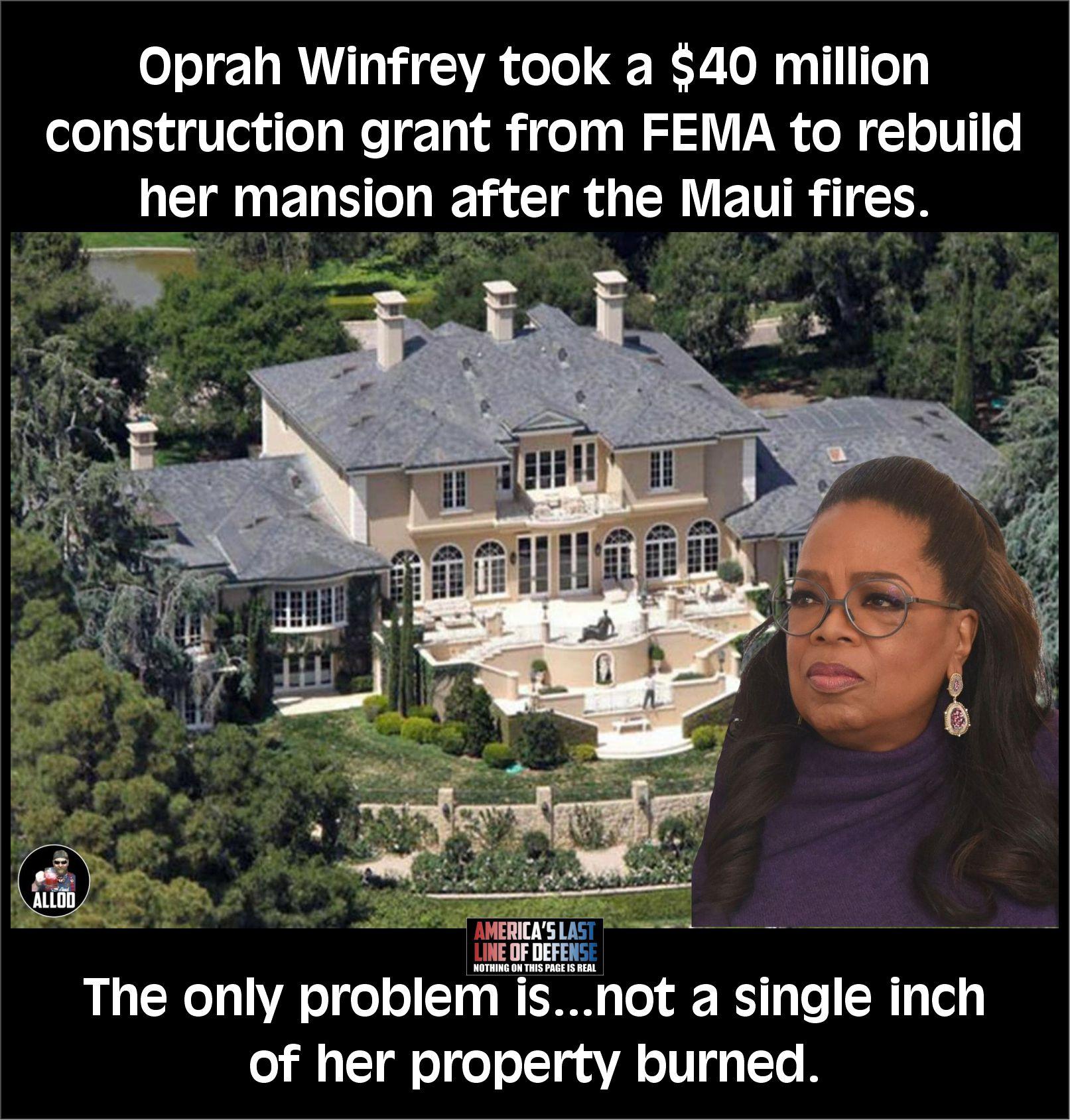In the aftermath of the devastating Maui wildfires in 2023, social media was quickly flooded with stories, claims, and conspiracy theories. Among the most viral was a meme alleging that Oprah Winfrey, who owns significant property in Maui, received a staggering $40 million construction grant from FEMA (Federal Emergency Management Agency) to rebuild her mansion—even though, according to the meme, her home had not been damaged at all. The post, often shared with sensational headlines and emotional captions, sparked outrage and disbelief across online communities. But how much truth does this claim actually hold?

To separate fact from fiction, it’s important to understand the origins of this rumor, the role FEMA plays in disaster relief, and Oprah Winfrey’s actual involvement in Maui’s recovery efforts.
The image, which circulated widely on Facebook and X (formerly Twitter), shows a photograph of Oprah Winfrey’s sprawling estate alongside a bold caption accusing her of misusing taxpayer dollars. However, small print within the meme reveals its true nature: it originated from a satirical outlet known for creating parody content. The watermark, “America’s Last Line of Defense – Nothing on this page is real,” is a disclaimer that the post is not factual reporting but a satirical piece intended for humor or commentary. Unfortunately, many users sharing the meme either missed or ignored this disclaimer, treating the content as legitimate news.
This phenomenon is far from new. In the digital era, satire often blurs into misinformation when context is stripped away. Once detached from its original source, parody content is reposted without disclaimers, allowing falsehoods to spread unchecked. That is precisely what happened with the Oprah meme: an obvious parody for some turned into “evidence” of corruption for others.
To assess the validity of the claim, one must look at FEMA’s structure and funding process. FEMA does not issue “construction grants” to rebuild private celebrity mansions. Its disaster relief funds are designed for community recovery, public infrastructure, emergency shelter, and modest individual assistance to displaced residents. The maximum grant to a single household is capped at far less than the millions alleged in the meme. In fact, FEMA support often struggles to cover even basic rebuilding costs for average families, making the idea of a $40 million payout to a billionaire completely implausible.
Oprah Winfrey’s Maui estate, located in the Upcountry region, was indeed spared from fire damage during the August 2023 disaster. Reports confirm that her property was untouched while nearby Lahaina suffered catastrophic destruction. Rather than applying for federal aid, Oprah became directly involved in philanthropic relief efforts. She personally distributed supplies at shelters, provided cots and toiletries to evacuees, and partnered with organizations to offer ongoing assistance. Alongside actor Dwayne “The Rock” Johnson, she co-founded the People’s Fund of Maui, pledging an initial $10 million to support displaced residents with direct cash payments. Far from taking taxpayer money, she was donating her own wealth to help others.
The persistence of such memes speaks to a deeper issue: public distrust of institutions and wealthy figures. In times of crisis, conspiracy theories thrive, often fueled by resentment that billionaires live in comfort while ordinary people suffer. Oprah, as one of the most recognizable media moguls in the world, became an easy target. The suggestion that she received special privileges from FEMA fits into a broader narrative of corruption and inequality—even when the facts say otherwise.
Experts on misinformation warn that memes like this can have lasting consequences. They erode trust not only in public figures but also in disaster response agencies. When people believe FEMA is funneling taxpayer dollars to billionaires instead of helping struggling families, confidence in the system declines, and legitimate relief efforts risk being undermined. The real danger of such viral claims is not that they mischaracterize Oprah’s actions, but that they discourage citizens from believing in or supporting recovery programs desperately needed by communities like Maui.
The Maui wildfires remain one of the deadliest natural disasters in modern U.S. history, with more than 100 confirmed deaths and thousands displaced. Recovery will take years, requiring collaboration between government, nonprofits, and individuals. Oprah’s philanthropic role is just one piece of that puzzle. While it is fair to question how wealth and privilege influence disaster recovery, spreading false claims distracts from the urgent needs of survivors who require housing, medical care, and financial stability.
The Oprah meme is a case study in how satire can morph into disinformation in today’s media environment. It demonstrates the importance of digital literacy: understanding the source of information, checking disclaimers, and recognizing that memes are not facts. The viral spread of such posts underscores the need for critical thinking and responsible sharing online.
Ultimately, Oprah Winfrey did not receive a $40 million FEMA grant. Her mansion was not burned in the Maui fires, and no federal agency paid to rebuild it. Instead, she has been a highly visible donor and volunteer, contributing her own resources to relief efforts. The story of her alleged FEMA payout is not just exaggerated—it is entirely fabricated. But the emotions it stirred are real, reflecting broader frustrations with wealth inequality, disaster response, and government accountability.
As Maui continues its long road to recovery, the focus should remain on survivors and the support they need—not on false rumors that distract from the real work at hand.





